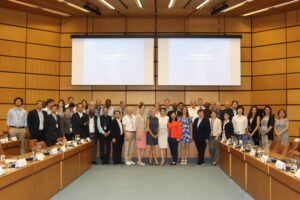Promoting cooperation through education networks is vital for preserving and managing nuclear knowledge and building on these partnerships is crucial for meeting common challenges and developing new education and collaboration mechanisms, experts agreed at a recent IAEA Technical Meeting on Educational Networks.
 At the meeting, held from 1 to 5 July 2019 in Vienna, 47 participants from 34 countries and four international organizations, including representatives from existing nuclear education networks and educational institutions, reviewed the status of these networks and discussed areas for potential future collaboration, and considered how to further optimize communication.
At the meeting, held from 1 to 5 July 2019 in Vienna, 47 participants from 34 countries and four international organizations, including representatives from existing nuclear education networks and educational institutions, reviewed the status of these networks and discussed areas for potential future collaboration, and considered how to further optimize communication.
The Regional Network for Education and Training in Nuclear Technology (STAR-NET) was presented by Dr. Andrey Timoshchenko of Belarusian State University, Dr. Tamara Segeda of East-Kazakhstan State Technical University, Dr. Mikolaj Oettingen of University of Science and Technology (AGH-UST), Poland, Prof. Andrei Kosilov of National Research Nuclear University MEPhI, Russia and Prof. Volodimir Kravchenko of Odessa National Technical University of Ukraine.
Representatives from each of the networks agreed to exchange information about events of common interest and to promote initiatives of other networks. A common action plan with guidelines on communication, human resource development, the use of digital tools and outreach activities was updated and agreed upon during the meeting and will guide synergistic network activities in the near future.
For more information visit the IAEA site at https://www.iaea.org/newscenter/news/experts-chart-course-at-first-iaea-technical-meeting-on-nuclear-education-networks